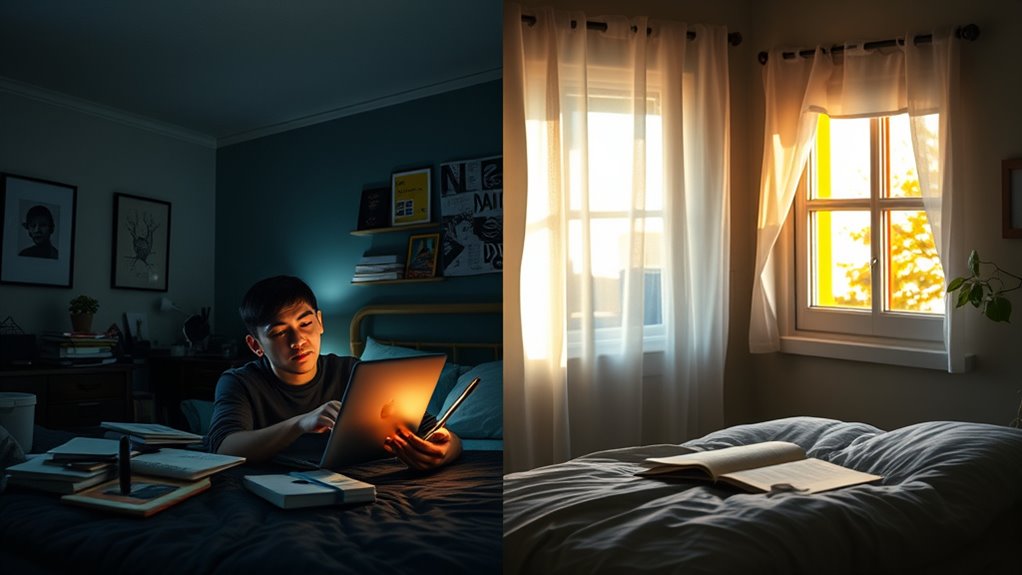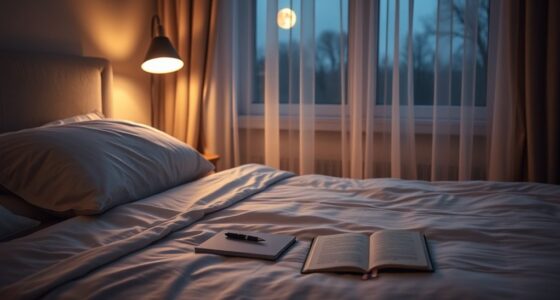Your sleep preferences as a night owl or early bird influence your dream recall by affecting when you experience REM sleep and how well your sleep cycles align with your natural rhythm. Night owls tend to have REM phases later, often during early morning hours, which can make dream recall easier if you wake then. Early birds usually wake earlier, potentially missing peak REM periods. Keep exploring to discover how your habits can boost vividness and recall of dreams.
Key Takeaways
- Night owls tend to experience REM sleep later, often during early morning hours, which can enhance dream recall if awakened during or after REM.
- Early birds typically wake earlier, possibly missing peak REM periods, leading to lower dream recall compared to night owls.
- Well-aligned circadian rhythms and consistent sleep schedules improve overall dream memory, benefiting both chronotypes.
- Sleep quality and continuity influence dream recall; fragmented sleep in night owls can impair dream retention.
- Understanding one’s chronotype helps optimize sleep timing and environment for better dream vividness and recall.

Have you ever wondered how your natural sleep preferences might influence your ability to remember dreams? Your circadian rhythm, the internal clock that governs your sleep-wake cycle, plays a significant role in shaping your overall sleep quality and, consequently, your dream recall. Night owls and early birds experience different phases of this rhythm, which can affect when and how vividly they dream. If you’re someone who tends to stay awake late into the night, your circadian rhythm naturally shifts your sleep cycle later, often leading to a different pattern of REM sleep — the sleep stage most associated with vivid dreaming. Conversely, early birds tend to wake up earlier and might experience their peak REM periods at different times, influencing how well they remember their dreams.
The quality of your sleep is closely intertwined with your circadian rhythm. When your internal clock aligns well with your sleep schedule, you’re more likely to experience uninterrupted, restorative sleep, which boosts your chances of recalling dreams. Night owls often find themselves going to bed later and waking up during the night or early morning, which can sometimes fragment sleep or cause it to be less restorative. This fragmentation might make it harder to remember dreams because the passage between sleep stages aren’t as smooth, and your brain might not fully process or retain dream memories. On the other hand, early birds tend to have more consistent sleep patterns, often going to bed and waking up at regular times, leading to higher sleep quality and more accessible dream recall.
Your natural chronotype also influences the timing of REM sleep. Night owls tend to experience REM cycles later in the sleep period, often during early morning hours, which might mean you’re more likely to remember dreams if you wake up during or just after REM sleep. Early risers, waking up earlier in the sleep cycle, might miss out on these vivid dreams or forget them more easily if they wake during non-REM stages. Additionally, your sleep habits and how well you follow your circadian rhythm can either enhance or impair your ability to hold onto dream memories. Maintaining consistent sleep schedules**** aligned with your natural chronotype tend to improve sleep quality, making dream recall more frequent and clearer.
In the end, understanding how your circadian rhythm influences your sleep quality can help you optimize your sleep environment and habits to improve dream recall. Whether you’re a night owl or an early bird, aligning your sleep routine with your internal clock can make a noticeable difference in how vividly you remember your dreams and how well you understand what your subconscious might be telling you.
Frequently Asked Questions
Can Sleep Environment Influence Dream Recall Differently for Night Owls and Early Birds?
Your sleep environment can influence your dream environment and recall differently depending on your natural sleep tendencies. Night owls might find a quiet, dark space helps them remember dreams better, while early birds may benefit from a consistent, calming setting that aligns with their morning routines. Creating an environment that suits your sleep style enhances your ability to recall dreams, making your sleep experience more enriching and insightful.
Do Chronotypes Affect the Content or Themes of Dreams?
You might wonder if your chronotype influences your dreams’ content or themes. It’s possible, as dreams often reflect your subconscious influences and dream symbolism. Night owls and early birds tend to process emotions and daily experiences differently, which may shape their dreams. So, yes, your internal clock could subtly affect the themes you experience in dreams, revealing unique insights into your subconscious mind.
How Does Sleep Quality Vary Between Night Owls and Early Risers?
You might notice that your sleep quality varies based on your sleep consistency and natural tendencies. Night owls often struggle with irregular sleep schedules, which can reduce overall sleep quality and decrease dream intensity. Early risers tend to have more consistent routines, leading to better sleep and more vivid dreams. Maintaining a regular sleep schedule helps improve both sleep quality and dream recall, regardless of whether you’re a night owl or an early bird.
Are There Specific Techniques to Improve Dream Recall Based on Chronotype?
To improve dream recall, you can try technique adaptations that suit your sleep patterns. For example, if you’re a night owl, set an intention to remember dreams right after waking, and keep a journal nearby. For early risers, record dreams immediately upon waking. Using chronotype specific methods like these helps you focus on remembering dreams more effectively, aligning your approach with your natural sleep tendencies.
Does Age Impact the Relationship Between Chronotype and Dream Recall?
When you look into whether age influences dream recall, you’re opening a can of worms. As you go through developmental stages, your sleep patterns and memory change, affecting how vividly you remember dreams. Younger people often recall dreams more easily, but this can shift with age. So, yes, age does play a role, and understanding this helps you better grasp the connection between your biological clock and dream recall.
Conclusion
So, whether you’re a night owl or an early bird, your chronotype shapes not just your daily habits but also how vividly you remember your dreams. Embrace your natural rhythm, for it’s the compass guiding your subconscious stories. Like the moon or the sun, your internal clock influences your dreamscape—so why not listen closely? After all, in the symphony of sleep, your chronotype is the melody that makes your dreams uniquely yours.










